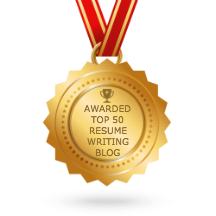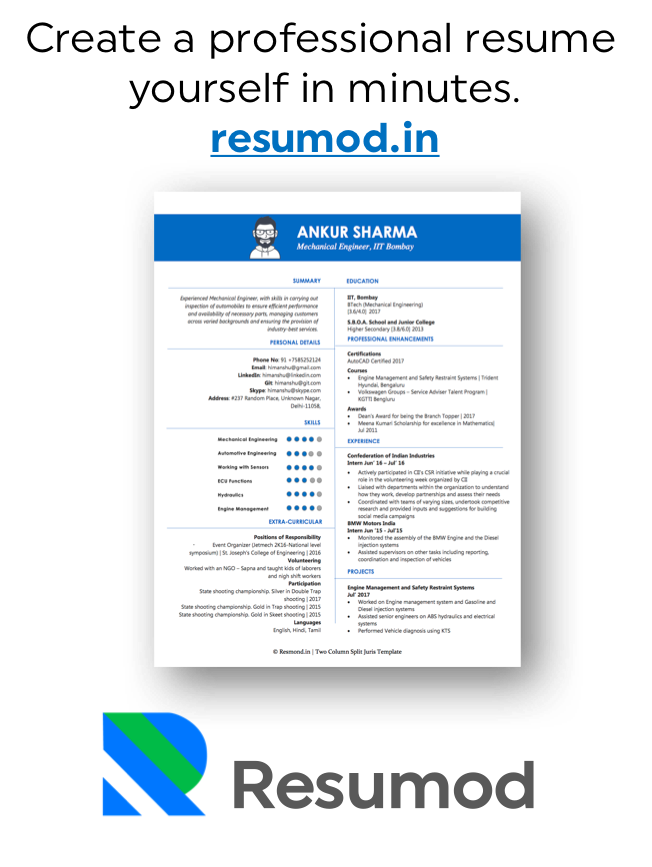This is a guest post by Abhyank Srinet, founder at MiM-Essay
Did you know the average recruiter spends only 6 seconds on a single resume?
And with 100’s if not 1000’s of applicants applying for the job role, you need to do everything in your power to make a strong impression and make your profile noteworthy.
Apart from making sure that you have a great format, optimized bullet points and clear sub-sections, you need to ensure that your resume contains no errors of any kind to increase your chances of getting shortlisted.
Check out these 10 common mistakes that people make in their resumes and how to correct them.
Goodluck!
1) Typos And Grammatical Errors
How many times has someone told you – ‘Don’t make any grammatical mistakes in your resume’? A lot of times I’m sure.
As obvious as it sounds, many people still end up making silly grammar mistakes such as wrong word choices, spelling errors, and punctuation errors which could be easily avoided.
Solution: To avoid making such mistakes, make sure you proofread your resume at least twice. Once done, ask your friends and family to do the same. You’d be surprised how many mistakes you overlook while proofreading your own resume.
You can also use Grammarly to correct any grammatical mistakes made in the resume.
2) Mix And Match Fonts
A recruiter has only 6 seconds to look at your resume and decide whether you would be a good fit. Don’t make this task more difficult for him than it already is.
Don’t mix and match fonts or overdo your resume by adding watermarks, designs, backgrounds, etc. It may look nice but it distracts the reader from accessing the information he’s looking for in the first place.
Solution: Keep it simple. Use a single font throughout the resume. Fonts such as Arial, Calibri, Garamond, Georgia, Helvetica will give a fluid look and make your resume stand apart from other resumes. You can also use tools like Resumod to ensure font and format consistency throughout the resume.
3) Incorrect Contact Information
Much like grammatical mistakes, people end up making mistakes in the contact information section. You completely lose your chances of getting the job if the recruiter has shortlisted you but isn’t able to reach you.
Also, it’s not advisable to mention email addresses such as handsomeAkhil@gmail.com in your resume as it looks very unprofessional.
Solution: Recheck your resume for any errors in contact details before sending it out to the employer. Also, mention your phone number along with country code and an appropriate email address in the Contact Details section.
For example, for someone like Akhil, a good email address can be AkhilChembil08@gmail.com
4) Resume Not Optimized For Bullet Points
Bullet points are pretty important as recruiters avoid going through huge blocks of data while skimming through a resume. So if your resume is not optimized for bullet points, it won’t get noticed even if you’re a perfect fit for the job.
Solution: Structure your data in the form of bullet points. Have 3-5 bullets per company and each bullet should not be more than 2 lines. Also, quantify your bullet points. It helps the reader understand the kind of impact you had in your previous company.
For example,
A better way to write ‘Responsible for finding an internet service provider’ is ‘Identified, researched and recommended a new Internet service provider, cutting the company’s online costs by 15 percent’
This way you shift focus on accomplishments from mere responsibilities.
5) Forgetting Action Words
What are Action Words?
Action Words are keywords that the recruiter is looking for in your resume, which is specific to the job opening. Additionally, a lot of companies use automated scanning software known as Applicant tracking systems (ATS) which specifically looks for Action words.
Many don’t realize the importance of actions words. Using action words, you can describe the same job in a way that it focuses on your achievements thereby creating a completely different impression for the reviewer.
Solution: Implement keywords which are specific to your job role.
For example, if are applying for a position in the marketing department starting your bullets points with words like ‘Developed, Formulated, Reduced, Maximized, Regulated’ instead of the boring ‘Responsible for..’ is a good option.
Statement 1: Responsible for making a marketing plan for a new product and successfully launching it in the market.
Statement 2: Developed strategic marketing plan to introduce product into international and domestic markets, launch exceeded forecasts by 17%.
Both statements essentially mean the same thing. But Statement 2 tells a better story and focuses on the person’s achievements (launch exceeded forecasts by 17%) rather than duties.
6) Not Highlighting Achievements
A resume is not the place to be modest.
Many people shy away from adding achievements (Workplace or otherwise) in their resume thinking it’ll make them come across as narcissistic. On the contrary, not having any achievements listed on your resume will put you at a disadvantage as there’ll be nothing to differentiate you from the crowd.
Solution: Share any awards or recognition you have received in a matter-of-fact manner.
Highlight achievements such as academic honors, club positions, etc which might be relevant to your future employer, make them understand the significance of it as well.
If you got a scholarship, be sure to mention that as well.
7) Adding Irrelevant Skills In The Resume
In the skills section, a lot of people tend to list all possible skills they possess.
The company you’re interviewing with is looking out for a specific set of skills in their prospective employee to get the job done. So any skills other than those select few will be considered irrelevant. Make sure you only add the relevant ones in your resume.
Solution: Go through the job description carefully and list down the skills required by the company. Mention them in your resume if you have any.
Also, if you have worked on any tool at your previous workplace that they have included in their job description, include it in your resume.
8) Not Tailoring Your Interests Section
Again this is where many people go wrong. Reading books, watching sitcoms, sports, traveling, scrapbooking, shopping, playing guitar, etc. are some of the most common activities seen in the interests section.
You don’t need to add all possible hobbies into this section.
Solution: Mention only those interests that resonate with the job role you’re applying for.
If your job requires you to be an outgoing and good team player, mentioning that you played Basketball at State-level is a good option. Mentioning chess or knitting is probably not a good idea.
9) Lying In Your Resume
Sometimes when you are looking for a new job, it’s tough to find one right away. You then end up with a couple of months of gap period that you wouldn’t like to bring to the notice of the recruiter. Many people, in similar situations, blatantly lie about the gap period in their resume by omitting it completely.
Besides that, many tend to lie about their grades, the number of people they worked with, their sales results hoping it’ll never be cross verified. It almost always is.
Solution: Never lie on your resume.
If you have a few months of gap period between two consecutive jobs, you can make it less of an issue by eliminating the exact start and end dates of the previous jobs in the work-ex section. Just mention the year and month for each of the jobs. If asked during the interview, be honest about it.
Also, don’t forget to mention any volunteer work, skills that you have picked up during the gap period.
As for your grades and other work-related details, it can be easily verified so it’s best if you remain honest about everything and focus on writing a resume that shows the best version of you. (If you need help writing a resume, you can refer ‘23 Resume Writing Tips to Create the Perfect Job Resume in 2017’)
10) One-Size-Fits-All Approach
You might be wondering why waste time to create a different resume for each employer since you’re applying for the same job everywhere?
That’s where many people go wrong. If you have a generic resume, it’s most likely to be tossed in a bin if the recruiter doesn’t believe you are a good fit for their organization. Employers expect you to clearly show how and why you fit the position in a specific organization.
Solution: Create a resume that’s tailored specifically for the company you’re applying to.
Look for any keywords mentioned in their job description and implement the same in your resume. This shows that you’ve gone through their job description carefully and will make you come across as a good fit for the job.
With the ever-growing list of job aspirants, the competition is getting fierce in terms of getting a job anywhere. Your resume is your first introduction to the recruiter and you need to create a good first impression.
Follow the above-mentioned tips and you’re already ahead of most people.
Now go get that job you were eyeing!




I know most of the freshers make mistakes at start of their career but Some extent of mistakes are okay, but be careful about terrible blunders at the start of your career and you have provided us some wiser tips to avoid these mistakes, so thanks a lot for this wonderful article, going to save this for sure.
Hey Great article..
relay good for all the freshers who are starting there corporate life.
Thank You.!!
Very useful and helpful article! I was looking for tips and tricks on writing resume and found here a great post which describes the common resume mistakes to avoid. I got to know that poor resumes may cost our dream job. Thanks a lot!